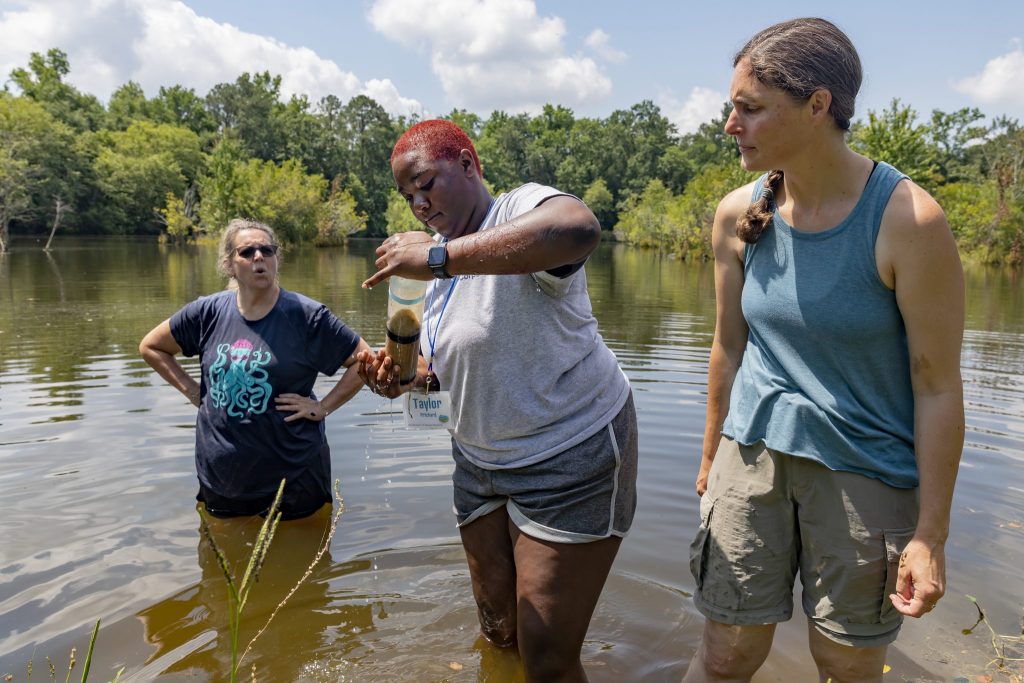With $1.25 million Science Education Partnership Award (SEPA) from the National Institute of General Medical Sciences, IE launches Iterative Design to Engage All (IDEA) Learners Program
December 1, 2021
First developed in the 1950s, per- and poly-fluoroalkyl substances (PFAS) are found in a variety of household items. They are used to create water-repellant fabrics, non-stick cookware, and a host of other products that repel grease, oil, and water. While common and useful, these chemicals have contaminated Earth’s water, air, and soil; and recent studies have shown their potential to cause adverse human health effects, ranging from immune suppression to an increased risk of cancer.
A new five-year program, led by the UNC Institute for the Environment’s Center for Public Engagement with Science (CPES), will use PFAS research as the basis for new STEM curricula to engage diverse learners. Teachers from North Carolina communities where PFAS contamination is high will co-develop the curricula with the CPES team and researchers from UNC system schools. Teachers will then use the curricula to introduce current biomedical science and careers to their students. Funded by the National Institute of General Medical Sciences, this $1.25 million grant will support 96 teachers in integrating PFAS research into instruction and inspiring the next generation of biomedical researchers. Science Education Partnership Awards like this one fund innovative STEM education projects to diversify the STEM workforce across the United States.
“We need as many diverse, creative minds thinking about solutions to environmental problems as possible,” says Kathleen Gray, principal investigator, CPES director, and a research associate professor. “A key focus of our program is supporting inclusive teaching practices that create on-ramps into biomedical science. We hope that our efforts will inform future practice so that we can open up science and problem-solving to a broader group of people, including those who are currently underrepresented in STEM.”
The CPES is partnering with science education researchers from the UNC School of Education and the NC State University College of Education, as well as environmental health scientists from the UNC Gillings School of Global Public Health and East Carolina University.
Programming is slated to begin in March 2022, when 8 STEM teachers join a curriculum design team that will develop PFAS-focused curricula. To make the content engaging for all students, including those underrepresented in STEM, Kelly Ryoo, an associate professor and Donald + Justeen Tarbet Distinguished Scholar in the UNC School of Education, will lead the team through a design-based thinking process.
Diverse scientists at the forefront of PFAS research will be invited to share their research and, in collaboration with teachers, will identify curriculum connections. The team will co-develop lessons that the teachers will pilot with students, and student feedback will inform revised lessons. This iterative approach to lesson development, combined with the active engagement of researchers, will be hallmarks of the program, resulting in timely and accessible content and meaningful outcomes for students.
In year two, design team teachers will mentor and teach a new cohort of educators via professional development featuring the curricula they helped develop. This design cycle will repeat in later years, resulting in a suite of lessons for STEM teachers to choose from as they incorporate PFAS science into their instruction. This program is expected to increase participating teachers’ knowledge of current PFAS research, their ability to incorporate research-generated data into instruction, and their confidence in promoting biomedical research careers to diverse students.
“Some of the most valuable information researchers can give to teachers, and in turn their students, is to describe how they became interested in STEM, their career trajectories, and model the science practices and skills needed in today’s and tomorrow’s biomedical research labs,” says Dana Haine, principal investigator and CPES K-12 science education manager.
Armed with up-to-date knowledge of the necessary skill sets in the biomedical research field, teachers will be able to promote diverse career paths and highlight the educational opportunities available at community colleges and universities to guide students into relevant STEM fields. “Our goal is to create instructional materials that showcase the diverse career paths that await students in the biomedical field, which is interdisciplinary and collaborative,” says Haine.
“I hope that this work will underscore that there is room for many different kinds of people to engage in environmental health sciences and help to solve the problems that we face,” says Gray. “It’s exciting for us to be part of a project that is fostering teaching practices that are responsive to the needs of diverse learners.”
The grant application was forged in partnership with the UNC Center for Environmental Health and Susceptibility(CEHS) in the UNC Gillings School of Global Public Health. The CEHS funds university infrastructure to support scientific equipment, facilities, and other resources that can be shared among environmental health researchers. CEHS identifies emerging issues that advance understanding of how pollutants and other environmental factors affect human biology and may lead to disease. Gray is the CEHS Community Engagement Core (CEC) director, and Haine is a CEC member.
Interested teachers can apply to participate in the first Design Team.
